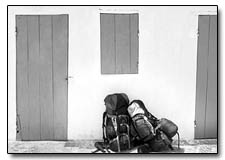|
 “Are
you going to sew a Canadian flag patch on your backpack?”
was the question I kept hearing. I was 21 and about to
head off to Australia for 10 months with my boyfriend,
Bryan. The question wasn’t totally out of left field;
many young Americans tell people they’re Canadian
when they’re overseas because they want “better
treatment.” But we wanted to try to be ambassadors
for our country and prove that not all Americans are loud,
insensitive “ugly Americans” (though they
definitely exist – we got to wait on plenty of them
during our stint as surf bum waiters in Maui). “Are
you going to sew a Canadian flag patch on your backpack?”
was the question I kept hearing. I was 21 and about to
head off to Australia for 10 months with my boyfriend,
Bryan. The question wasn’t totally out of left field;
many young Americans tell people they’re Canadian
when they’re overseas because they want “better
treatment.” But we wanted to try to be ambassadors
for our country and prove that not all Americans are loud,
insensitive “ugly Americans” (though they
definitely exist – we got to wait on plenty of them
during our stint as surf bum waiters in Maui).
Like a lot of people, we ended up getting hooked on travel
and spent most of our 20s scraping together money at odd
jobs to save for trips to Third World countries, since
the dollar stretches so much further. We never did cave
in and sew on Canadian patches, though it was sometimes
taxing to always be on the defensive.
Often the anti-American digs were direct, like the man
we met in Hoi An, Vietnam, who sneered, “In Belgium,
we were protesting the Vietnam War” (ah yes, there
were no protests here). When watching an action movie
at a hostel in Thailand, an Australian turned to us and
said, “Americans sure do like to blow things up!”
The sentiment has even followed me home: Recently I received
a Christmas card from a friend in Australia, whose new
British husband scribbled at the bottom, “Why don’t
you ever see mixed race couples on U.S. TV? Unwritten
rule? Have a very Merry Xmas.”
But mostly, it was indirect stuff, like how everyone
in Manila, the Philippines, called out to Bryan, “Hey
Joe!” as though, despite his ponytail and goatee,
he could be a G.I., like the ones unpopularly stationed
there for most of recent history. Or our new friends we
met in Las Tablas, Panama, during Carnival, who happily
told us they’d met there for Carnival every year
“except 1989 – U.S. invasion.” There
was even a man from South Vietnam who wanted to take us
on a tour of the Demilitarized Zone because he had fought
alongside the United States during the war – and
then spent several years in a prison camp after U.S. troops
withdrew.
Anytime I’d come in contact with these sorts of
sentiments, I’d try to explain that there’s
more to Americans than our government’s foreign
policy or our TV and movies. I’d stress our strengths,
such as the beauty of our natural areas, our passionate
activists, our cultural diversity or our strong communities.
Often a light would go off in someone’s eyes as
preconceived notions melted away, guards were let down
and a little cultural insight was gained.
But we would return from our months abroad still searching
for a home – a community that embodied all those
elements. We knew it was out there, but nothing quite
fit. Washington, D.C., Seattle, California and even Maui
were dead ends. We decided to try to get rich quick in
Taiwan (a failed experiment, incidentally) and see where
it led. We spent a lot of nights in a polluted city called
Tainan searching for the perfect home on the Internet,
and we learned of Durango for the first time.
We came back and spent the summer driving around and
checking out places to settle, and Durango ended up being
a no-brainer. It had everything I’d described to
foreign skeptics: diversity, natural beauty, a strong
sense of community. Plus, the skiing, year-round fly fishing
and number of microbreweries were an added bonus.
We lived at the Siesta Motel for five days until we landed
an apartment. From the get-go, Durango just felt right
– and it still does. I love that the employees at
the Post Office are much nicer than the expression “Go
postal” implies, and that people stop to pet each
other’s dogs. I’m thrilled to live in a town
so unpretentious that it’s allegedly the worst dressed
town in America. And the people we’ve met are incredible.
As we start another year in Durango, I’m still
incredibly grateful to have found the America I’d
been describing during my travels all along.
– Jen Reeder
|

